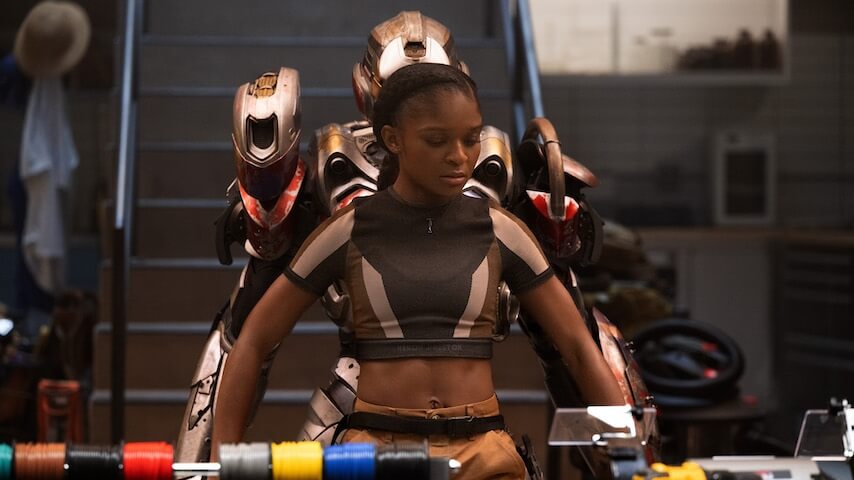Ironheart blurs the line between Marvel prestige and bland comfort TV
The Disney+ miniseries ends with brimstone, bionics, and a bummer of a cliffhanger.
Photo: Jalen Marlowe/MARVEL
Did Marvel Studios just produce its first Arrowverse series? Yes, Ironheart is unmistakably a Marvel show—with its budget-busting digital effects and prestige sheen, it can sometimes even look like a Marvel movie—but the final three episodes of the Disney+ miniseries give the uncanny feeling they were beamed in from some parallel-Earth version of The CW. With Riri Williams (Dominique Thorne) holed up at Gary’s Auto with her friends and family, frantically welding together a new suit in record time, only to have her crew stand around emoting while she processes the next phase of her hero’s journey, the back half of Ironheart gave off strong Flash vibes. Gary’s Auto had become an ersatz S.T.A.R. Labs: a home base where emotions run high, coffee’s on tap, and problems get scienced. Step aside, Team Flash; Team Ironheart is here.
This isn’t shade (I happen to enjoy the Arrowverse), but the shoe fits: Like a certain nine-season DC superhero series, Ironheart races past resonance—specifically, the themes of class and marginalization it only gestured at early on—in favor of earnest emotions and a frustrating cliffhanger that left consequences for its lead to be resolved at a later date. (I forget, did Barry Allen ever learn to stop breaking the timeline?) Like The Flash, Ironheart sets up flimsy emotional stakes while occasionally indulging in superhero action but mostly features an ensemble sitting around solving problems caused by a lack of communication. That’s Ironheart: dilemmas generated by keeping secrets from trustworthy people, forgiveness given because it’s nicer than holding a grudge. Despite all that brimstone creeping in during the finale, the status quo of Ironheart remains uncomplicated and, sadly, uninteresting.
And yet, as we prepare to shelve this series alongside Marvel’s other uneven streaming entries, its finale warps the mostly frictionless drama—distilled into astro-glide by the end—into something more spiritually gnarly. After witnessing her AI bestie N.A.T.A.L.I.E. (Lyric Ross) vanish due to magic tinkering by rookie sorcerer Zelma (Regan Aliyah), Riri seemingly trades her soul to a devil she barely understands—Mephisto, or a Kroger-brand version of him (Sacha Baron Cohen)—in exchange for bringing Natalie back. Not a new digital copy, but a living, breathing Natalie. Bad idea? Sure. But it’s the kind of impulsive, guilt-driven act a young hero might make and something Ironheart established in its lead quite well. So, what’s the price she’ll pay? Her soul? Natalie’s? After a mostly juiceless first season, this wild twist comes along and demands a second.
But let me rewind: As episode four begins, we find Parker Robbins (Anthony Ramos), a man of many honeyed words, suddenly at a loss for them after the death of his lifelong friend, John (Manny Montana). Grief is a tight fit for someone used to wearing a billowy number; The Hood is rendered silent, but his eyes write a tome for Riri. (The title might go something like I Know It Was You.) Still, death doesn’t slow the Desperito’s Pizza crew. There’s work to be done, and Riri is central to it. “I have plans for you,” Parker tells her. Meanwhile, Riri’s Heirlum misadventure left behind more than a body: The biomesh she borrowed from Ezekiel Stane (Alden Ehrenreich) has been recovered by authorities, exposing his identity and landing him in jail under a domestic terrorism rap. (It’s strange that John’s body didn’t send the cops to Desperito’s; maybe he left his business cards at home for once?) Zeke doesn’t take her visit well: “You lie, you cheat, you manipulate,” he says, Ehrenreich’s eyes swimming with fury. “Even if that means hurting other people.”
 Keep scrolling for more great stories.
Keep scrolling for more great stories.
